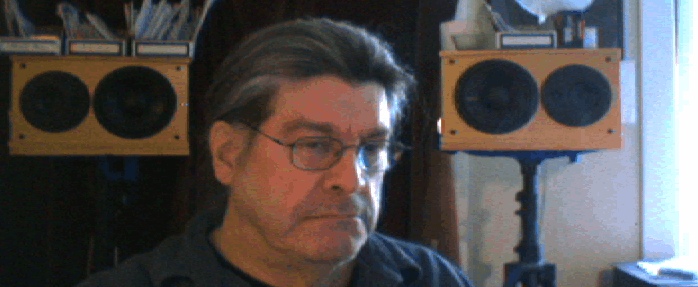
Stephen Barncard's work in the entertainment industry is legendary; Record Engineer/Producer, Director of Talent Acquisition, Remote Recording Director, Senior Engineer, Archivist and historian.
He's worked in the studio with such rock luminaries as Crosby, Stills, Nash & Young (and many permutations thereof), The Grateful Dead, Van Morrison, and Jefferson Airplane, as well as The Doobie Brothers, Joe Cocker, Creedence Clearwater Revival, and The Tubes.
When David Crosby was asked for his angle on Barncard, he gave me this assessment:
"Stephen Barncard is one of the best and (oddly) least known of the really great producer/engineers... He and I made what is still my favorite record of all my solo stuff ever... Probably the best recordist of acoustic guitar in the world... and a good guy."
Ten weeks after arriving in California from Kansas City (where he worked in radio as a combo operator/dj and as a local studio owner/producer/engineer), Barncard was hired at Wally Heider's Studio in San Francisco in August of 1969. After two weeks of familiarizing himself with that studio, Barncard was given the task of assisting Bill Halverson on the engineering end of Crosby, Stills, Nash & Young's first album as a foursome, “Deja Vu” (1970), a record of such influence that to this day still makes an impressive showing on every relevant writer's list of the “100 Greatest Rock Recordings” of all time.
“Deja Vu” was only the first in a string of hugely influential recordings that Barncard was to have a hand in getting on tape, assisting on Paul Kantner's "Blows Against The Empire", WAR's first album, a Bill Evans solo record and others. Before long, instead of assisting, he was engineering his own sessions for top clients, including Van Morrison (1971's “Tupelo Honey”), Seals & Crofts, Nils Lofsgrin, Jerry Williams, and Steve Miller.
Barncard explains: “My big advantage at (Wally) Heider's is that I came in to be an assistant, but management knew that I had previous experience in recording. I had developed techniques of my own by rote, and polished them on my own sessions. I picked up a few tricks by backing Russ Gary, Bruce Botnick, Bill Halverson and Glyn Johns in sessions at Heider's, but unlike many in the business, I did not have a firm set of rules that I adopted by following a strong studio owner or top mixer, I sort of followed my own drummer. Wally set no conditions for me... except to make the clients happy.”
In 1970, the Grateful Dead were looking to “reinvent” their studio sound, and with Barncard's growing expertise, recorded what many consider to be their most coherent, concise, and consistent recording, “American Beauty”.
Meanwhile, after David Crosby had decided to embark on his landmark solo effort (with help from his many friends), he sought out Barncard's services as engineer. Crosby was in top form artistically, and the resulting album, 1971's “If I Could Only Remember My Name” became what many audiophiles consider to be a model of recorded studio sound for its time. After that followed many projects at Heiders, like Steve Miller, Seals and Crofts, New Riders of the Purple Sage, The Doobie Brothers, Tom Jans and Mimi Farina, Graham Central Station and Ali Ackbar Khan.
After leaving Heider's in 1973, Barncard went independent, working with many clients and friends gained while working at 245 Hyde St. Working with local acts like the Sons Of Champlin, The Tubes, Mike Finnigan, R.J. Fox, Oasis and others, the idea was to gain experience and credibility with other kinds of music besides folk rock and Americana. It was during this time that he also designed and built a console and studio electronics for the Grateful Dead at Bob Weir's house in Mill Valley, Ca.
A move to Los Angeles followed. David Crosby and Graham Nash again came calling in 1975 to ask Stephen to work on "Wind On The Water", "Whistling Down the Wire in 1976, and "Live" in 1977.
He later worked on projects for Joe Cocker, KGB, Jennifer Warnes, Art Garfunkel, David Bromberg, and a multitude of independent artists. Then, in 1978-79, he branched out further: A&R for Elektra/Asylum Records, and in the early eighties, into both the film and video game industries, working for powerhouse Datamost software and Roger Corman pictures.
His place of career residence from 1986 to 1998 was at A&M Studios as Senior Engineer, which expanded his involvement in another long stream of projects. Another landmark project in 1991 was the long-anticipated CSN box set on Atlantic, where Barncard was enlisted again by CSN to mix over 21 previously unreleased tracks on the set.
In 1997, with his connection to David Crosby and Graham Nash going on it's twenty-eighth year, Stephen produced (and with Nash, mixed) the much anticipated 1971 Crosby-Nash archive recording, “Another Stoney Evening” for Grateful Dead Records.
After leaving A&M in 1998, he spent a year sabbatical in Paris and Mendocino, Ca. and returned to independent production in the San Francisco Bay area. Recent mixing projects include Steel Train, Mitch Marcus Quintet, Sweet Snacks and Mood Food. In addition he's been quite active in remote recording in the bay area.
In 2010, Barncard launched his innovative mixstream service which makes his mixing talent available to clients from anywhere in the world, through live streaming of his mix sessions.
In 2014, Barncard set up shop in Sebastopol, California, where he runs his mixstream.org studio.
Randy
NIGHTFLY62 at aol.com
Randy is a professional singer/songwriter/guitarist as well as a self-studied musicologist and freelance website contributor. He lives Northern New Jersey.
Copyright ©1999,2010 by Lark Publishing (Randy). All rights reserved.